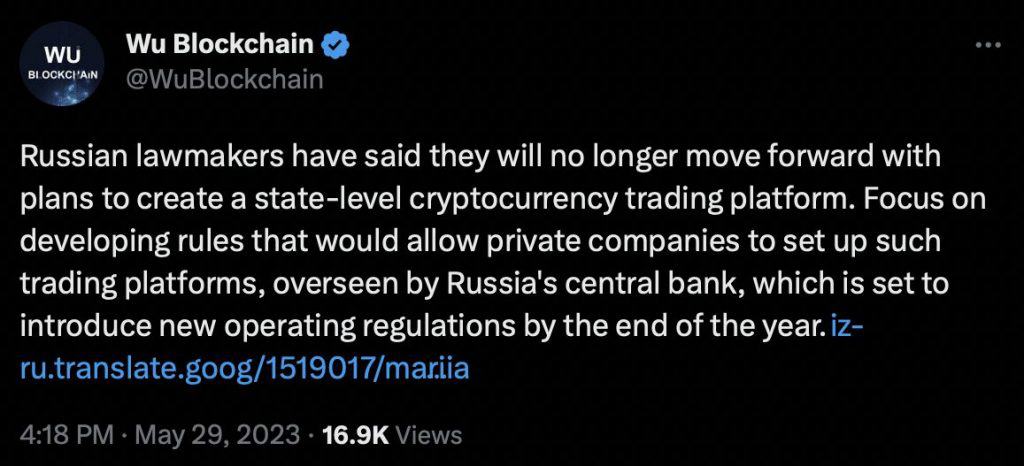The decision to abandon the idea of a government-operated cryptocurrency exchange was confirmed by Russian authorities.
In Brief
Russia has chosen to discontinue the development of a cryptocurrency exchange that would be under state control, focusing instead on regulating private enterprises in the sector.
As reported by Izvestia, the country's strategy is shifting towards enabling private entities to set up crypto exchanges.

The Russian legislative body has set aside the proposal for a state-owned crypto exchange to concentrate on establishing a framework for existing platforms. rules The news outlet Izvestia revealed that the state's new approach would embrace the creation of cryptocurrency exchanges by private firms, with Colin Wu from Wu Blockchain tweeting this update early in the week. wrote on Sunday.
Ivan Chebeskov, the Director of Financial Policy at the Russian Ministry of Finance, stated that the Financial Policy Department did not support the idea of a government-run exchange. Instead, they are contemplating the legal avenues for businesses to create such platforms.

Aksakov, the chairman of the financial markets committee of the Russian Duma, indicated that instead of developing a single national crypto exchange, the intention is to craft guidelines governing the creation and operation of such entities. He mentioned that these crypto exchanges would be authorized to facilitate international payments, although he did not provide specific details and acknowledged potential new limitations.
According to Izvestia, it’s likely that the Central Bank will oversee these platforms, managing international transactions under the established regulatory framework of the Russian Federation. This shift has prompted several private crypto players in Russia to consider entering the marketplace.
Oleg Ogienko from BitRiver mentioned, \"This will mitigate the risks associated with sanctions and cyber threats to our infrastructure while also preventing potential market monopolies.\" Ivan Gostev from GIS Mining stated that this new policy could foster a landscape conducive to the emergence of competitive and groundbreaking companies.
The stance on digital assets in Russia has varied dramatically over the years. Back in May 2017, the Bank of Russia suggested an outright ban on cryptocurrency transactions, shortly followed by a proposal from the Ministry of Finance to regulate Bitcoin. The next year, Vladimir Putin enacted a law against payments in digital currencies, yet the nation later explored stablecoins as a workaround for sanctions.
Crypto exchange Huobi, together with Visa, is gearing up to introduce the Huobi Visa card.
Read more related articles:
- Please remember that the content available on this page is not meant to serve as legal, financial, or investment advice. It's crucial to invest only what you can safely afford to lose and to seek independent financial counsel if you have any uncertainties. For more details, we recommend checking the issuer's or advertiser's terms and conditions as well as their support pages. MetaversePost is dedicated to providing reliable and impartial news, although market dynamics may change unexpectedly.
- Top 10 Crypto Exchanges in Korea
- Valeria serves as a journalist for Metaverse Post, where she covers fundraising, artificial intelligence, the metaverse, digital fashion, NFTs, and all aspects of web3.
Disclaimer
In line with the Trust Project guidelines Having earned a Master's degree in Public Communications, Valeria is currently pursuing an additional Major in International Business Management. In her spare time, she indulges in photography and fashion styling. At just 13 years old, she launched her first fashion-centric blog, igniting her passion for journalism and style.







